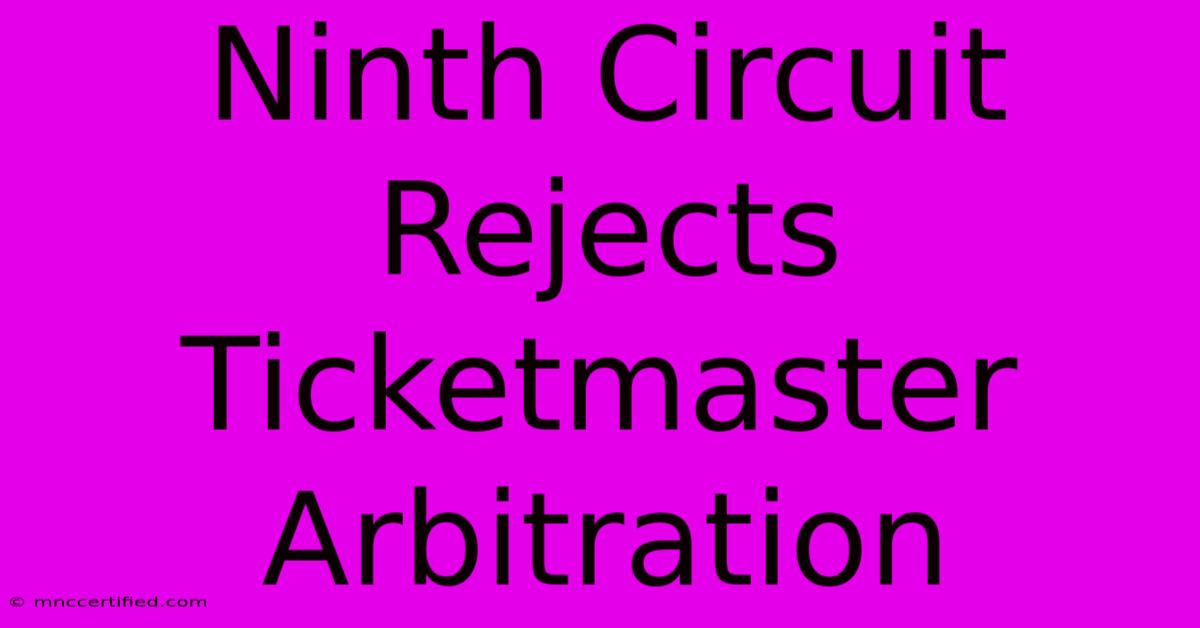Ninth Circuit Rejects Ticketmaster Arbitration

Table of Contents
Ninth Circuit Rejects Ticketmaster Arbitration: A Win for Consumers?
The Ninth Circuit Court of Appeals recently delivered a significant blow to Ticketmaster in its ongoing battle over forced arbitration clauses. This decision, which rejects Ticketmaster's attempts to enforce mandatory arbitration against its customers, has sent ripples through the entertainment industry and consumer rights advocacy groups. This article delves into the details of the ruling, its implications, and what it means for the future of consumer protection in the face of powerful corporations.
Understanding the Case Against Ticketmaster
The case centers around Ticketmaster's standard terms of service, which include a mandatory arbitration clause. This clause requires customers to resolve any disputes with Ticketmaster through private arbitration rather than in a public court. Many critics argue that such clauses are unfair, favoring powerful corporations like Ticketmaster over individual consumers. They argue these clauses limit consumers' access to justice and discourage class-action lawsuits, which are often necessary to hold large companies accountable for widespread wrongdoing.
The Ninth Circuit's ruling directly challenges this practice. The court found that Ticketmaster's arbitration clause was unconscionable, meaning it was so one-sided and unfair as to be unenforceable. This determination was based on several key factors, including:
Key Factors in the Ninth Circuit's Ruling
- Opacity of the Arbitration Clause: The court highlighted the difficulty consumers faced in understanding the terms of service and the arbitration clause buried within. The fine print and complex legal language made it nearly impossible for the average consumer to comprehend the implications of agreeing to arbitration.
- Unilateral Nature of the Agreement: Ticketmaster unilaterally imposed the arbitration clause, giving consumers little to no negotiating power. This lack of reciprocity contributed to the court's finding of unconscionability.
- Cost and Accessibility: The court considered the financial burdens associated with arbitration, particularly the potential for hefty costs and fees that could make it prohibitively expensive for consumers to pursue their claims. The accessibility of arbitration, or lack thereof, was also a factor.
Implications of the Ninth Circuit's Decision
This ruling has several important implications:
- Increased Consumer Protection: The decision strengthens consumer protection by limiting the ability of companies to use mandatory arbitration clauses to avoid accountability.
- Potential for Class-Action Lawsuits: The ruling opens the door for potential class-action lawsuits against Ticketmaster, allowing many consumers to collectively pursue claims for alleged wrongdoing.
- Impact on the Entertainment Industry: The decision may influence other companies in the entertainment industry, prompting a review of their own terms of service and arbitration clauses. It sets a significant precedent, potentially discouraging the use of similarly one-sided agreements.
- Shifting the Balance of Power: The Ninth Circuit's decision is a step towards shifting the balance of power from corporations to consumers, providing a more equitable legal playing field.
What's Next?
The impact of this ruling remains to be seen. Ticketmaster could appeal the decision to the Supreme Court, though the likelihood of success is uncertain given the established precedent on unconscionable contracts. Regardless of future appeals, the Ninth Circuit's decision serves as a potent reminder of the importance of transparent and fair consumer contracts and the ongoing battle for consumer rights against corporate power. This case is a significant victory for consumer advocacy groups and highlights the need for ongoing scrutiny of contract terms and corporate practices.
Keywords: Ticketmaster, arbitration, Ninth Circuit, consumer protection, unconscionable contract, class-action lawsuit, mandatory arbitration, terms of service, consumer rights, legal precedent, appeal, Supreme Court, fine print, legal language.
Off-Page SEO Strategies:
- Link Building: Reach out to relevant websites and blogs focusing on consumer rights, legal news, and the entertainment industry to secure backlinks to this article.
- Social Media Promotion: Share the article on relevant social media platforms, using targeted hashtags to reach a wider audience. Engage with comments and discussions.
- Guest Blogging: Write guest posts on related websites, subtly linking back to this article within the content.
- Press Release Distribution: Distribute a press release announcing the publication of the article to relevant news outlets and media publications.
This article provides a comprehensive overview of the Ninth Circuit's ruling and its implications. Remember to always consult with legal professionals for specific legal advice.

Thank you for visiting our website wich cover about Ninth Circuit Rejects Ticketmaster Arbitration. We hope the information provided has been useful to you. Feel free to contact us if you have any questions or need further assistance. See you next time and dont miss to bookmark.
Featured Posts
-
Preview Man City Vs Feyenoord Lineup
Nov 27, 2024
-
Vanderpump Rules Cast Future Projects
Nov 27, 2024
-
Kansas Duke Game Live Score Updates
Nov 27, 2024
-
Lotto Jackpot Won 7 4m Saturday Prize
Nov 27, 2024
-
Village Auto Insurance Georgia
Nov 27, 2024